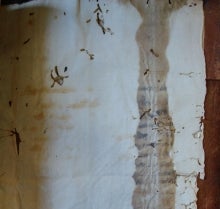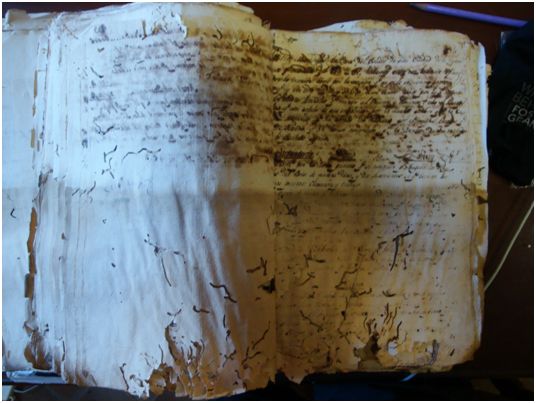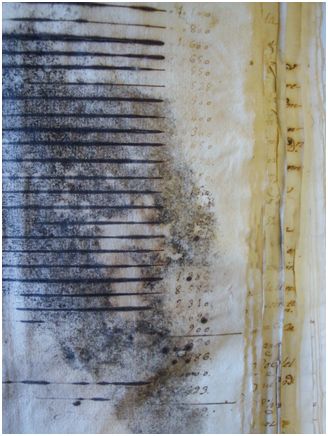States of Disrepair and the Politics of Archival Neglect

A picture can say more than a thousand words, but this one calls for scrutiny. That a centuries-old document is nearly destroyed might not sound surprising, yet the passage time, bad weather, and lack of resources cannot be held accountable. Negligent authorities should be. I see this image as a symbol of the deplorable condition of some Mexican institutions and their failure to preserve our memory.

***
Last summer, Professor Elisabeth Le Guin and I embarked on a research trip to Mexico. [Read her own account here.] We searched traces of comic theater in New Spain in the late colonial era (1770s-1820s). Some scholars told us that we would not uncover anything new—no musical scores, at least—but we kept our hopes high. A catalogue published in the 1990s indicated that a regional archive holds dozens of references to theatrical stages and troupes active in Spain, New Orleans, Cuba, Yucatan, and Mexico’s Gulf regions. We wanted to find more about those performing spaces and communities. We are also interested in the continuity, or lack thereof, of their musical traditions.
We soon learned that at least a third of the archive is now inaccessible due to severe damage. Luckily, we were able to access some of the restricted cardboard boxes, where we encountered thousands of documents affected by a recent flood. Many are still humid and covered in fungi. Entire paragraphs are vanishing each passing day and, with them, richly detailed notes on trans-Atlantic commerce, public works, military affairs, and public festivities since the 17th century. It is heartbreaking.
Although we were able to take some notes and pictures, our frustration did not subside. We wanted to do something helpful, but realized that a true rescue mission would require the collaboration between state authorities, universities, NGOs, and tens of thousands of dollars. We are also aware that publicizing our findings more would bring trouble to the personnel who gave us access. They cannot do much, and we do not want to expose them. Those of you who are versed in Mexico’s politics and institutions can probably guess where we were anyway, and why a response is not likely to come soon.

***
We have tried to find solace in the survival of some oral repertoires and the fact that living communities can restore collective memories through music and other performing traditions. However, I cannot stop obsessing over the irreparable wounds inflicted by archival negligence and the disappearance of information that was supposed to be secure. I would like to scratch those wounds open again, hoping that some of you will gain awareness of the issues that are at stake in countries without the same infrastructure and archival culture as, say, France or the United States.
The destruction of an 18th-century document is not business as usual in Mexico. These disasters are not always expected in tropical countries in more precarious economic situations, so please dispel those assumptions. Mexican archivists do tighten their belts, but they are certainly capable of repairing a ceiling or affording plastic containers to protect a hundred cardboard boxes. It was not lack of expertise either. Mexico has functioning archives and college-trained information experts. Modern archival practices began to be adopted in the latter half of the 18th century, as a result of the Bourbon reforms, whose purpose was to rationalize statecraft (Aceves et al. 2011). No wonder that the archive we consulted has (had) so many records from that very era. Those documents survived numerous storms, civil wars, and armed invasions by Spain, France, and the United States. Although not in pristine conditions, they were certainly dry and legible twenty-five years ago, when the catalogue we consulted was published.
That 30% of a venerable archive was lost in the blink of an eye, in less than a generation, is not so much the outcome of underdevelopment as a symptom of the decay of some Mexican political and cultural institutions. I point my finger at state officials and bureaucracies who have been unwilling to rise to the scrupulousness of their predecessors or unable to enforce newer standards of preservation since the 1970s. We witness a similar combination of indolence and incompetence in other administrative areas, including education, whose institutions are also underfunded and overwhelmed.
In countries with authoritarian legacies, like Mexico, formal and informal mafias can take control of budgets and government offices with no accountability. Some fail to comply with any obligations because they use public resources to reward their affiliates and to perpetuate themselves in power (instead of hiring professionals or investing in infrastructure). Federal institutions do enforce some standards and procedures. However, local authorities have gained remarkable power since the onset of the democratic transition, and this has not always been for the best, for they can be as inefficient or impervious to criticism as the old regime.
How can we organize a rescue mission when local state authorities who have power and obligation to preserve archives are also the ones swindling millions of taxpayer dollars? Are they going to care for something as arcane as musical theater in the Iberian-American Enlightenment if they do not even give a damn about the spike in murder rates (and are maybe complicit in it)? It might be prudent to remind U.S. scholars, who are understandably worried by the prospect of reduced funding for education and the arts, but who are also used to reasonably transparent procedures, that state intervention in cultural affairs is not always the solution to all ills.[1] In our case, state authorities “cancelled” the documents damaged by water. This means that custodians sealed them in their humid boxes and are waiting for a strongman to give them instructions and a handout … and hoping that nobody will notice. Few consult archives in Mexico. Not even local scholars were aware of the problem before we arrived. The fact that this didn’t raise an eyebrow shows that we have all grown used to an utter state of disrepair.
***
Some historians and ethnographers have grown disenchanted with traditional archives in recent years, and this is no less true in music scholarship. Their observations are well taken. 1) Archives are artificial repositories of information that should not be fetishized. 2) They cater to the needs of specific groups and do not reflect everyone’s stories, values, or forms of remembrance. 3) In fact, archives have been used by the powerful to enforce hegemonic forms of knowledge. Hence, many today are willing to modify archival praxis by making room for audiovisual testimonies, providing greater accessibility, or updating and diversifying sources of information (O’Toole 2000, Chaudhuri and Seeger 2004, Jimerson 2011).
These efforts are laudable, but they should also be recognized as luxurious. In situations like the one I described, the physical integrity of a vulnerable archive is at stake and should be prioritized, not because it is inherently more valuable, but because it is wholly irreplaceable. I know this should not be an either/or question, but resources are limited.
In any case, wittingly or unwittingly, some scholars have been demoting the value of traditional archival research while riding the high wave of oral history. They are right in being critical about archives that were used to control, distort, or silence subaltern voices. However, the solution is not to set them aside. Archives and repertories are equally necessary in any project to reconstruct communal rites and historical narratives (Taylor 2003). While oral testimonies fill gaps that documentation fails to provide, living communities need written records to reconstitute their cultural practices, for traditions are mutable and people do forget them, or can be led to do so.
That a colonial archive was not tailored to the mores and values of indigenous or popular cultures does not mean that it cannot shed light on them. In the case of our flooded archive, for example, we have lost capacity to understand the development of several regional and trans-Atlantic musical traditions, if only for the greater number of (mis)representations and (dis)continuities that a better-preserved corpus would have revealed to the discerning eye. Living communities are hurt by the obliteration of all types of archives—even those that do not represent them faithfully. Therefore, researchers invested in the well-being of those communities should also care about the state of all relevant historical records. We will surely need to keep these nuances in mind as we continue to define the aims and parameters of historical ethnomusicology (McCollum and Hebert, 2014).
On your next field trip, spend a few days in the archives and grow familiar with their politics. Become active participants in those cultures too. A dusty basement is less enticing than the open field, but it is no less relevant to your project or the people you study. Above all, demand answers. If necessary, voice your discontent. As representatives of foreign and prestigious academic institutions, you have moral standing and the capacity to pressure authorities to improve their image. This is within your reach and will be of great service. Scholars are not doing any good by losing track of public records or taking them for granted. I am not saying that this situation is our fault, but I am noting that it is our collective responsibility to be actively engaged. Do not get settled in the culture of archival disdain.
[1] The future of Mexican public archives has been intensely debated since November 2016, when a project to reform current legislation was submitted to Congress. The new law would give the Ministry of the Interior (Secretaría de Gobernación) faculties to withhold information and to censor or re-classify historical records that are already accessible. Similar reforms could then be pursued at the local level. We face a situation in which governments could gain more control over information while losing incentives to preserve truthful records—a conundrum of Orwellian proportions. You can follow these discussions on the website of the Comité Mexicano de Ciencias Históricas.
Note that private enterprise is not a panacea either. NGOs are not allowed, and should not be expected, to take over the responsibility to preserve public archives. Outsourcing such duties to private institutions in the neoliberal era has also contributed to the state of neglect.
References
Aceves, Merizanda M. C., Ariel Sánchez Espinoza, Diana Birrichaga Gardida, and Luz del Carmen Beltrán Cabrera. 2011. “El devenir histórico de la cultura archivística en México.” Información, cultura y sociedad 24. Accessed April 27, 2017. http://ref.scielo.org/3nr84m
Blouin Jr., Francis X., and William G. Rosenberg. 2011. Processing the Past: Contesting Authority in History and the Archives. Oxford and New York: Oxford University Press.
Chaudhuri, Shubha, and Anthony Seeger. 2004. Archives for the Future: Global Perspectives on Audiovisual Archives in the 21st Century. Calcutta: Seagull Books.
Jimerson, Randall. 2011. “How Archivists ‘Control the Past’.” In Controlling the Past: Documenting Society and Institutions – Essays in Honor of Helen Willa Samuels, edited by Terry Cook, 363-382. Chicago: The Society of American Archivists.
McCollum, Jonathan, and David G. Hebert. 2014. “Foundations of Historical Ethnomusicology.” In Theory and Method in Historical Ethnomusicology, edited by Jonathan McCollum and David G. Hebert, 1-34. Lanham: Lexington Books.
O’Toole, James. 2000. “On the Idea of Permanence.” In American Archival Studies: Readings in Theory and Practice, edited by Randall C. Jimerson, 475-494. Chicago: The Society of American Archivists.
Taylor, Diana. 2003. The Archive and the Repertoire: Performing Cultural Memory in the Americas. Durham and London: Duke University Press.
Alejandro García Sudo is a fourth year student and a doctoral candidate in the UCLA Department of Musicology. He obtained a B.A. in International Relations from El Colegio de México and a M.A. in Musicology from The University of Western Ontario. His dissertation focuses on music and inter-American cultural diplomacy during the Pan American era. His Other contributions to Ethnomusicology Review can be found here.





